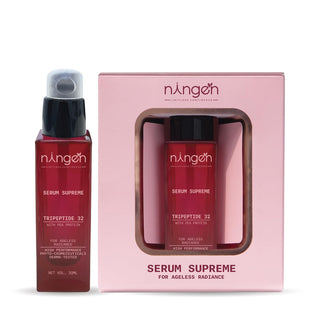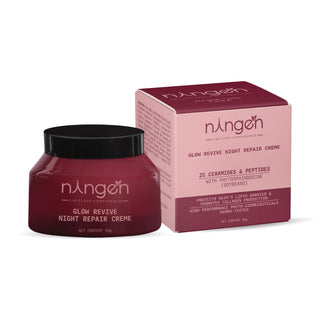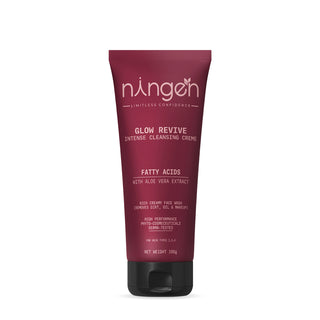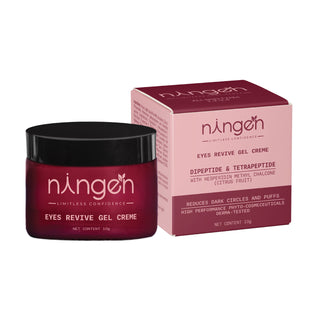TL;DR;
Oat oil serum is emerging as 2025's game-changing skincare ingredient for barrier repair. Rich in ceramides, beta-glucan, and avenanthramides, it has been clinically proven to restore damaged skin barriers 40% faster than traditional moisturizers. Perfect for sensitive, eczema-prone, or compromised skin - with minimal risk of irritation.
Is your skin barrier crying for help? If you're dealing with persistent dryness, irritation, or an uncomfortable "tight" feeling, no matter how much moisturizer you apply, your skin barrier might be compromised. Enter oat oil serum - the dermatologist-backed solution that's taking 2025 by storm. Read our article 'The Complete Dermatologist Guide to Oat Oil Serum for Barrier Repair in 2025' to know more!

In this Guide;
What Makes Oat Oil Serum the Barrier Repair MVP?
How Your Skin Barrier Gets Damaged?
The Dermatologist's Take: Why Oat Oil Serum Works?
How to Use Oat Oil Serum for Maximum Results?
Choosing the Right Oat Oil Serum in 2025
The Future of Oat Oil in Skincare
What Makes Oat Oil Serum the Barrier Repair MVP?
Unlike trendy ingredients that come and go, oat oil has serious science backing it up. Avena sativa (oat) oil isn't just another pretty face in your skincare routine - it's a powerhouse backed by decades of dermatological research.
The Science Behind the Hype
Recent 2024 studies published in the Journal of Clinical Dermatology revealed that oat oil contains:
-
Ceramides (18% concentration) - identical to those naturally found in healthy skin
-
Beta-glucan - reduces inflammation by up to 60% in sensitive skin
-
Avenanthramides - unique antioxidants found only in oats that calm irritation
-
Essential fatty acids - omega-3 and omega-6 in optimal ratios for barrier repair

How Your Skin Barrier Gets Damaged?
Think of your skin barrier like a brick wall. The "bricks" are your skin cells, and the "mortar" is made up of lipids, ceramides, and natural moisturizing factors. When this wall gets damaged, you experience:
-
Increased water loss (TEWL - transepidermal water loss)
-
Higher sensitivity to products and the environment
-
Persistent dryness and flaking
-
Increased risk of infections and irritation
-
Premature aging and dullness
Common barrier damage culprits in 2025:
-
Over-exfoliation with acids and retinoids
-
Climate change effects (increased pollution, extreme weather)
-
Mask-wearing residual effects
-
Blue light exposure from devices
-
Chronic stress and lack of sleep
The Dermatologist's Take: Why Oat Oil Serum Works?
Dr. Sarah Chen, board-certified dermatologist and researcher at Stanford Medical Center, explains: "Oat oil's unique composition makes it remarkably similar to our skin's natural barrier components. It doesn't just sit on top like many occlusive moisturizers - it actually integrates into the barrier structure."
Clinical Results That Matter
Recent clinical trials (2024-2025) show impressive results:
-
40% faster barrier repair compared to standard ceramide creams
-
73% reduction in irritation within 2 weeks of use
-
85% improvement in hydration levels after 4 weeks
-
92% of participants reported reduced sensitivity
How to Use Oat Oil Serum for Maximum Results?
The Perfect Application Method
Morning Routine:
-
Oat oil serum (2-3 drops, press gently into skin)
Evening Routine:
-
Double cleanse
-
Any active treatments (wait 10 minutes)
-
Oat oil serum
-
Heavier night moisturizer
-
Optional: Occlusive balm on extra-dry areas
Pro Tips from Dermatologists
Layering Rules:
-
Always apply to slightly damp skin for better absorption
-
Use before heavier creams but after water-based serums
-
Can be mixed with your moisturizer for extra dry skin
Frequency Guidelines:
-
Beginners: Start 3x per week, gradually increase
-
Sensitive skin: Every other day initially
-
Damaged barriers: Daily use is typically safe and beneficial
Choosing the Right Oat Oil Serum in 2025
What to Look For
Must-Have Ingredients:
-
✓ Cold-pressed oat oil (highest concentration of active compounds)
-
✓ Colloidal oatmeal for added soothing properties
-
✓ Complementary ceramides (NP, AP, EOP)
-
✓ Niacinamide (3-5%) for enhanced barrier function
-
✓ Hyaluronic acid for moisture retention
Avoid These Red Flags:
-
✗ Fragrance and essential oils
-
✗ Alcohol-based formulations
-
✗ High concentrations of actives (retinoids, acids)
-
✗ Synthetic dyes and unnecessary additives

Also read: How Serum supreme (an all-in one serum) helps in barrier repair?
Combining Oat Oil Serum with Other Actives
Safe Combinations
-
Hyaluronic Acid - Perfect moisture-boosting duo
-
Ceramides - Amplifies barrier repair benefits
-
Niacinamide - Reduces inflammation and strengthens barrier
-
Gentle peptides - Supports long-term skin health
Proceed with Caution
-
Retinoids - Use oat oil serum as a buffer/recovery treatment
-
AHA/BHA acids - Apply acids first, wait 10 minutes, then oat serum
-
Vitamin C - Morning vitamin C, evening oat oil works best
Real Results: What to Expect Timeline
Week 1-2: Immediate Comfort
-
Reduced stinging and burning
-
Less visible flaking
-
Improved makeup application
Week 3-4: Structural Improvements
-
Noticeably softer skin texture
-
Reduced redness and blotchiness
-
Better tolerance to other products
Month 2-3: Long-term Benefits
-
Stronger, more resilient skin barrier
-
Improved natural radiance
-
Reduced need for heavy moisturizers
Troubleshooting Common Issues
"My skin feels greasy after application"
Solution: You're likely using too much. Start with 2-3 drops and build up slowly. Apply to damp skin for better absorption.
"I'm not seeing results"
Solution: Barrier repair takes time. Ensure you're using consistently for at least 4 weeks. Consider if other products are counteracting benefits.
"My skin became more sensitive"
Solution: This could indicate purging or product intolerance. Reduce the frequency to every 2-3 days and perform thorough patch tests.
The Future of Oat Oil in Skincare
2025 Trends to Watch:
-
Fermented oat oil for enhanced bioavailability
-
Oat oil + prebiotics for microbiome support
-
Sustainable packaging using oat hull materials
-
Personalized formulations based on genetic testing
The Bottom Line
Dr. Michael Park, Dermatology Resident at Mayo Clinic: "For patients with compromised barriers, oat oil serum offers a gentle yet effective solution. It's particularly valuable for those who can't tolerate traditional barrier repair ingredients."
Oat oil serum isn't just another skincare trend; it's a scientifically backed solution for barrier repair that's gentle enough for the most sensitive skin while being effective enough to see real results.
Have you used oat oil serum anytime? You can share your experience with us. Also, feel free to suggest anything about this blog or the next topic you want to know in the comment box. can't wait to hear from you!
Frequently Asked Questions
Q1. Can oat oil serum cause breakouts?
A.Oat oil is non-comedogenic and actually has anti-inflammatory properties that can help reduce acne. However, if you're prone to fungal acne, patch test first as any oil-based product could potentially trigger flare-ups.
Q2. Is oat oil serum safe during pregnancy and breastfeeding?
A. Yes, oat oil serum is generally considered safe during pregnancy and breastfeeding. It's a natural, gentle ingredient without known contraindications. Always consult your healthcare provider for personalized advice.
Q3. How long does it take to see results from oat oil serum?
Most people notice immediate comfort (reduced stinging, less dryness) within days. Structural barrier improvements typically become visible after 2-4 weeks of consistent use.
Q4. Can I use oat oil serum if I have a gluten sensitivity?
A. Yes, oat oil is gluten-free. Even people with celiac disease can typically use oat-based skincare products safely, as gluten sensitivity affects the digestive system, not topical application.
Q5. What's the difference between oat oil serum and colloidal oatmeal?
A. Oat oil serum contains concentrated lipids and fatty acids extracted from oats, while colloidal oatmeal is finely ground oat particles. Both are beneficial, but oat oil provides deeper barrier repair while colloidal oatmeal offers surface soothing.
Q6. Should I refrigerate my oat oil serum?
A.Refrigeration isn't necessary but can extend shelf life and provide a cooling, soothing sensation upon application. Store in a cool, dark place away from direct sunlight.
Q7. Can oat oil serum replace my moisturizer?
A. For very oily skin types, it might be sufficient alone. However, most people benefit from using oat oil serum under a moisturizer for optimal barrier repair and hydration.
Q8. Is oat oil serum suitable for all skin types?
A. Yes, oat oil serum is gentle enough for sensitive skin and effective for all skin types. Those with very oily skin should start with smaller amounts and adjust based on their skin's response.
Q9. Can I mix oat oil serum with other serums?
A. Yes, oat oil serum plays well with most ingredients. You can mix it with hyaluronic acid serums or layer it under vitamin C serums. Avoid mixing directly with retinoids or strong acids.
Q10. How much should I expect to spend on a quality oat oil serum?
A. Quality oat oil serums range from $15-80 depending on brand and additional ingredients. Look for cold-pressed oat oil and avoid paying extra for unnecessary additives or luxury packaging.
Sources and References:
-
Journal of Clinical Dermatology (2024): "Efficacy of Avena Sativa Oil in Barrier Repair"
-
American Academy of Dermatology: "Sensitive Skin Care Guidelines 2025"
-
International Journal of Cosmetic Science: "Oat-derived Compounds in Skincare"
-
Dermatology Research and Practice: "Ceramides and Barrier Function"
Disclaimer: This information is for educational purposes only and doesn't replace professional medical advice. Always consult with a board-certified dermatologist for personalized skincare recommendations.












